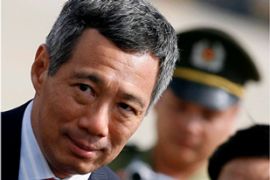Singapore to ban political film
Government says film about former political prisoner is “against public interest”.

| “I based my questions to Said on his first book, which is sold in Singapore. So what is in the film is not something the government didn’t know”
Martyn See, film director |
The ministry said in a statement: “The government will not allow people who had posed a security threat to the country in the past to exploit the use of films to purvey a false and distorted portrayal of their past actions and detention by the government.”
Lee Hsien Loong, Singapore’s prime minister has acknowledged tensions over regulations that tightly restrict the media and free speech, but defended them as necessary to maintain order.
Approval
See said the film, produced at the end of 2005, had been approved twice last year with a PG rating.
When it was not shown at the 2006 Singapore International Film Festival, as he expected, See applied for an exhibition licence to screen it publicly.
“I don’t know what changed. Maybe different people with different views watched it this time,” See said.
“I based my questions to Said on his first book, which is sold in Singapore. So what is in the film is not something the government didn’t know.”
| “I feel sorry for Singaporeans who have not been given a chance to see the other side of Singapore history, particularly the 1960s and ’70s. It’s not fair”
Said Zahari, political activist |
He said he had been ordered by the censorship board to surrender all copies of the film by Wednesday afternoon.
Said, who was held without trial, said from his home in Malaysia that was shocked to hear of the ban. He said he had already accepted an invitation to visit Singapore next month to give a speech at the film’s screening by a university film institute.
“This is very funny. I don’t understand why they would ban it at all. What I said in the movie I have already said in my book, and much, much more,” he said.
“That was 40 years ago. Is the government still afraid?”
“I feel sorry for Singaporeans who have not been given a chance to see the other side of Singapore history, particularly the 1960s and ’70s. It’s not fair.”
Said’s detention came in the early years after British colonisers gave self-government to Singapore in 1959.
‘Left-wing politics’
In the early 1960s, authorities arrested left-wing politicians, trade unionists and Chinese students involved in strikes and rallies, accusing them of being violent subversives planning a communist state.
Singapore, which was planning a merger with what later became Malaysia, said the swoop was aimed at individuals threatening to use violence to sabotage the proposed amalgamation.
The detainees were jailed under the colonial-era internal security act, which allows for arrest without charge and indefinite detention without trial.
Said, who denied the accusations, was held for years, sometimes in solitary confinement, after the merger failed in 1965 and Singapore became independent.